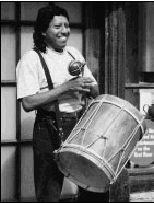| A Statement to
the Lambeth Conference A word from the Anglican Indigenous Peoples Network To our Dear Brothers and Sisters in Christ, As members and friends of the Anglican Indigenous Peoples Network,we would like to share some special concerns with the Lambeth Conference. With few exceptions, the concerns of Indigenous People have  been invisible here. The many issues that are
before us are clearly important and urgent. However, we respectfully ask that the
Conference consider another perspective which we consider vital. been invisible here. The many issues that are
before us are clearly important and urgent. However, we respectfully ask that the
Conference consider another perspective which we consider vital.Unfortunately, Indigenous Peoples have often been invisible. For a recent example, we may look to G-Code 2000, the mid-decade assessment of the Decade of Evangelism. People from all over the world gathered at Kanuga for G-Code--- an impressive cross section of Anglican Mission. It was the Maori delegation that reminded the assembled that they gathered on Native land. Even though the mission to the Indigenous Peoples of the Americas is the first and oldest Anglican missionary effort, no one bothered to question their absence. The Anglican Communion and Indigenous People Yes, the modern era of missions, which gave birth to our Communion, began with the first outreach to Indigenous People in North America. Since then, the mission to the Indigenous Nations throughout the world has been a key component in the establishment of many dioceses and provinces. The invisibility of Indigenous People and their concerns at the Lambeth Conference is stunning in light of the long history of the Church's mission to them. In light of the present day situation of Indigenous People this invisibility is more than stunning, it is frightening. Often found living within the boundaries of the ``First World'' countries of the north, they experience poverty and hunger at a level that parallels conditions in the Two-Thirds World. Though they retain their Tribal identity and relationship to the Land, Indigenous People are also frequently found living in urban environments. Statements regarding the wealth of the ``First World''ignore the poverty of the many. Strategies for mission in urban environments do not consider their presence. In the battle between North and South, Indigenous Peoples rarely rate an after thought. Indigenous People in the World Today Today, Indigenous Peoples,The People of the Land, stand, both spiritually and physically, in the way of a spirituality of greed in a global culture of consumption. Spiritually, their family and clan based traditionalism is in the first line against Scientific Materialism. Physically, they inhabit the dangerous border between a greedy world and the resources necessary for over-consumption. Only rarely do nations bother to go through the charade of debt to steal from the Indigenous Peoples. They say,``It is our land. They are our resources (cf.Rev.18).'' Those who get in the way are in extreme cases simply murdered in overt genocide. Many more are destroyed, with only slightly less speed, in the aftermath of cultural and spiritual destruction-displacement and theft, disease and hunger, suicide and despair. Although all people feel the ``fragmentation'' of modern life, Indigenous Peoples do not see it as a problem of ``pluralism and diversity.'' It is the larger dominant culture's unforgiving call to ``fit in'' to the larger scheme of things.The eagerness of many to appropriate Native symbols does not hide the basic innocent contexts. For example, two preliminary section reports here at Lambeth have said that the fragmentation of modern life leads to a ``New Tribalism.'' To Indigenous People,``Tribalism'' is the opposite-a clan based communal identity is associated with survival, hospitality and solidarity with all of Creation and her Creator. The mechanisms and institutions that are developed to cope with the fragmentation of modern life are often destructive for Indigenous Peoples. For example, many types of counselling are based on an understanding of ``Self '' that is derived from the present cultural reality of massconsumer-oriented culture.When applied to Indigenous People, these therapies are more than ineffective-they can only increase a sense of fragmentation and alienation. Where do we go? One fourth of the world's remaining usable land is now in the hands of Indigenous People. It will, no doubt, be the ``battlefield'' of many conflicts among the nations in the years to come. What is the hope of Indigenous Peoples in this precarious situation? Witnessing how easy it has been``not to notice''the tribal nations in this conference one is tempted to fear. If neither side of a cultural conflict can see Indigenous Peoples, will they be seen in the battles for land, air and water that will surely be a feature of much of the next century. Yet, despite all that could be said in the negative, today, Indigenous Peoples throughout the world are in a Spirit-led cultural renaissance. Many are accepting the New Life of the Gospel with great momentum. Where this has happened, it has only strengthened the Spirit-based Traditionalism of their societies. Certainly it has also intensified the struggle they have with a globe eating culture of consumption. The songs and prayers are getting stronger; the voice of Jesus is clear, and the power that sustains life never more evident. The question for this Conference is not: ``Will Indigenous Peoples stand ?'' After more than 500 years of deadly hostility aimed toward them, they still do---with pride and strength. Similarly, the question is not, ``Does Jesus stand with them?'' The question for the Conference is whether the Anglican Communion stands with the Indigenous Peoples. Submitted by Bishop Mark MacDonald (Alaska, US) on behalf of the Anglican Indigenous Peoples Network. Back to front page of this issue |
